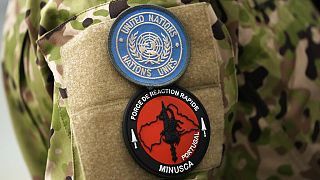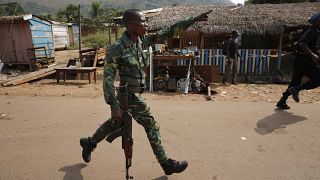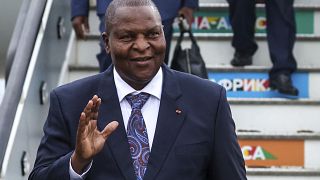Central African Republic
Gender-based violence is increasing in the Central African Republic amid ongoing conflict, a weak legal system and the stigma of speaking up, locals and aid groups say.
Since 2020, incidents have jumped from about 9,200 reported cases to 25,500, according to cases tracked by the United Nations and partners, but international funding for the country has dropped, with gender-based violence receiving little support.
Less than 15% of the about 14 million U.S. dollars requested in humanitarian assistance has been received, according to the U.N., with donor fatigue and the impact of multiple global crises blamed for the lack in funding.
The alleged perpetrators of gender-based violence include everyone, from bandits to U.N. peacekeepers and military contractors from Wagner.
The U.N. has long wrestled with allegations of sexual assaults by peacekeepers in the African nation and elsewhere.
Three years ago, the secretary-general ordered the immediate repatriation of the entire Gabonese peacekeeping contingent following credible reports of sexual abuse.
One woman who spoke to The Associated Press on the condition of anonymity claimed she was raped by a member of MINUSCA, the United Nations Multidimensional Integrated Stabilization Mission in the Central African Republic.
She said she struggled to share her story or to seek redress.
“I turned to my church pastor, who advised me to pray a lot for myself and not to sue the man who raped me. He didn't want me to lose my job, so I didn't tell anyone", she explained.
Doctors Without Borders says it has seen an increase in the number of survivors of gender-based violence seeking help due to the expansion of its services and outreach.
But still, it says the majority of survivors likely don’t come forward, often because help is not available where they live.
Women who do come forward find it hard to receive justice, according to the Association For Women Lawyers for Central Africa, which had 213 cases of sexual assault and rape reported in 2022 and 304 cases in 2023.
Sometimes women open a case against local fighters but withdraw it because perpetrators' families pay survivors not to proceed, according to the association.
Central African Republic's new constitution has adopted measures to tackle the issue, saying authorities must combat all forms of violence against women and ensure that sexual assault is eliminated.
The Central African Republic has been in conflict since 2013, when predominantly Muslim rebels seized power and forced the president from office.
Mostly Christian militias fought back.
A 2019 peace deal only lessened the fighting, and six of the 14 armed groups that signed later left the agreement.
A U.N. peacekeeping mission and troops from Rwanda all have boots on the ground to help quell the violence, as does the Wagner mercenary group, which operates alongside the country's army and has been accused by locals and rights groups of abuses.











Go to video
At least 7 members of Nigerian security force missing after insurgents ambush convoy
01:09
Residents of Haitian capital improvise for their shelter
01:07
Pro-palestinian demonstrators protest in Rio de Janeiro as G20 summit unfolds
01:32
US: Washington barricaded as election anxiety mounts
Go to video
Chad threatens to exit regional security force after deadly attack
01:57
CAR: MINUSCA head stresses “importance of” renewing stabilization mission’s mandate